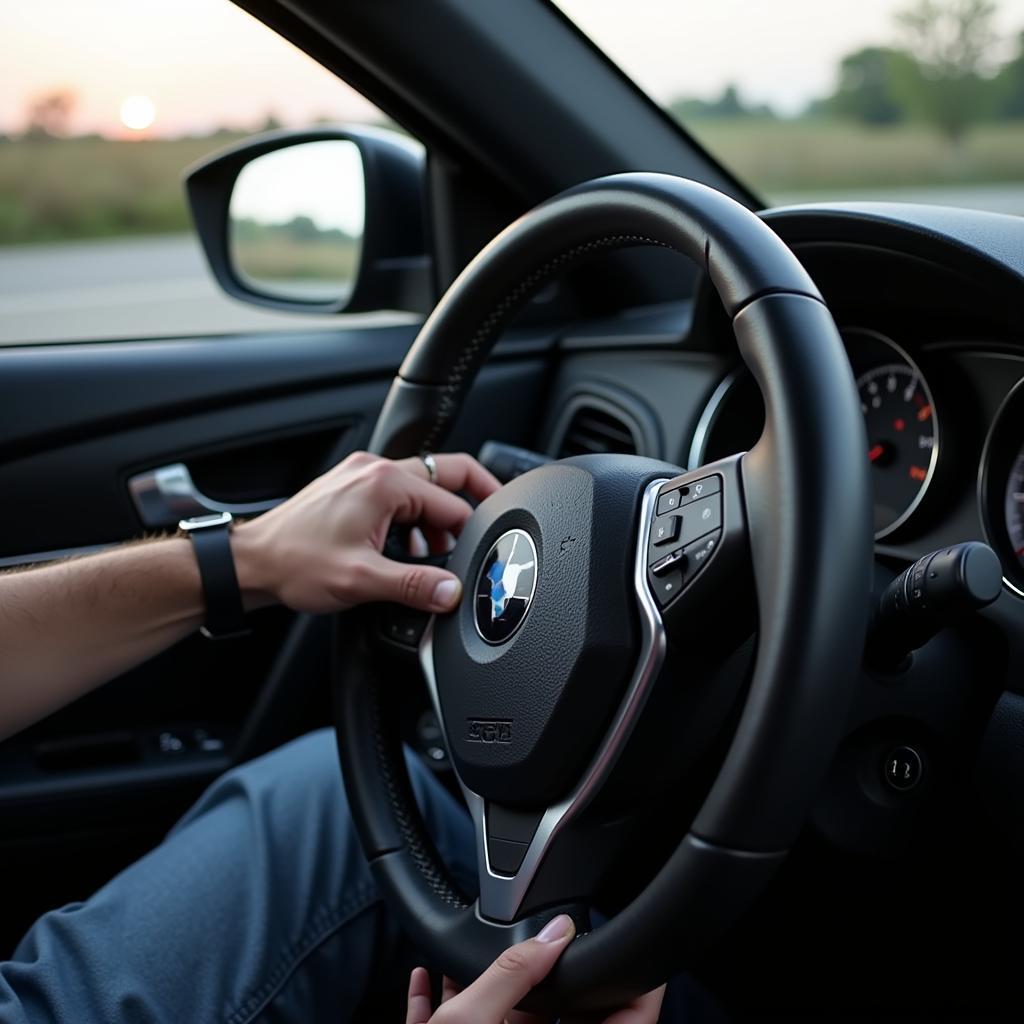Car Jerks When Turning at Low Speeds
November 13, 2024If your Car Jerks When Turning At Low Speeds, you’re likely experiencing a frustrating and potentially concerning issue. This problem can manifest in various ways, from a slight shudder to a violent jolt, and can significantly impact your driving experience. Understanding the potential causes and solutions is crucial for both your safety and the longevity of your vehicle.
Why Does My Car Jerk When Turning at Low Speeds?
Several factors can contribute to your car jerking when turning at low speeds. These range from simple maintenance issues to more complex mechanical problems. Pinpointing the exact cause requires careful consideration of the symptoms and a thorough inspection.
Common Culprits Behind the Jerking Sensation
-
Low Power Steering Fluid: One of the most common reasons for jerking during low-speed turns is low power steering fluid. The fluid provides the necessary hydraulic pressure to assist in steering. When the fluid level is low, the system struggles to provide smooth operation, resulting in jerky movements.
-
Worn Power Steering Pump: The power steering pump is responsible for circulating the power steering fluid. If the pump is worn or malfunctioning, it can’t provide the required pressure, leading to inconsistent steering assistance and jerking.
-
Damaged CV Joints: Constant velocity (CV) joints are crucial components of the drivetrain, allowing the wheels to turn at different angles while maintaining a constant speed. Worn or damaged CV joints, particularly the outer ones, can cause a clicking or popping sound, often accompanied by a jerking sensation, especially when turning at low speeds.
-
Faulty Steering Rack: The steering rack translates the rotational motion of the steering wheel into the linear motion needed to turn the wheels. A worn or damaged steering rack can cause binding or sticking, resulting in a jerky turning experience.
-
Suspension Problems: Issues with suspension components like tie rod ends, ball joints, or control arms can also contribute to jerking during turns. These components play a vital role in maintaining wheel alignment and stability.
Identifying the Specific Issue
Diagnosing the specific cause of the jerking requires careful observation. Pay attention to when the jerking occurs. Is it only when turning, or does it happen while driving straight as well? Does it occur more frequently during cold weather or after the car has been sitting for a while? These details can provide valuable clues to your mechanic.
How to Fix a Car That Jerks When Turning at Low Speeds
Addressing the jerking issue involves identifying the root cause and implementing the appropriate solution. Here are some common fixes:
-
Check and Top Off Power Steering Fluid: The simplest solution is often the most effective. Check your power steering fluid level and top it off if necessary. Consult your owner’s manual for the correct type of fluid.
-
Inspect and Replace Worn Components: If topping off the fluid doesn’t resolve the issue, have a mechanic inspect the power steering pump, CV joints, steering rack, and suspension components. Worn or damaged parts should be replaced promptly.
-
Wheel Alignment and Balancing: Improper wheel alignment or unbalanced tires can also contribute to jerking sensations. Having your wheels aligned and balanced can often resolve the issue.
“Regular maintenance is key to preventing many of these issues,” advises John Smith, a certified automotive technician with over 20 years of experience. “Simple checks like monitoring fluid levels and having regular inspections can save you from costly repairs down the road.”
Conclusion
A car that jerks when turning at low speeds can be a sign of several underlying problems. By understanding the potential causes and taking appropriate action, you can restore smooth handling and ensure a safe driving experience. Don’t ignore the jerking—address it promptly to prevent further damage and maintain the longevity of your vehicle.
FAQs
-
Can low tire pressure cause jerking when turning? While low tire pressure can affect handling, it’s less likely to cause jerking specifically when turning at low speeds.
-
Is it safe to drive my car if it’s jerking? It depends on the severity. If the jerking is significant or accompanied by other symptoms, it’s best to avoid driving and have the car inspected.
-
How much does it cost to fix a jerking problem? The cost varies depending on the underlying cause and the necessary repairs.
-
Can I fix this problem myself? Simple tasks like checking fluid levels can be done at home. However, more complex repairs require professional expertise.
-
How often should I check my power steering fluid? It’s recommended to check your power steering fluid level at least once a month.
 Car Steering Wheel Smooth Turning After Repair
Car Steering Wheel Smooth Turning After Repair
“Addressing steering issues promptly not only improves your driving experience but also enhances safety,” adds Sarah Johnson, a senior automotive engineer. “A properly functioning steering system is crucial for maintaining control of your vehicle and avoiding potential accidents.”
For further assistance, please contact us at Phone Number: 0915117117113, Email: [email protected], or visit our address: Tổ 3 Kp Bình An, Phú Thương, Việt Nam, Bình Phước 830000, Việt Nam. We have a 24/7 customer support team. You might also find these helpful: [link to another blog post about car maintenance], [link to a blog post about power steering problems].